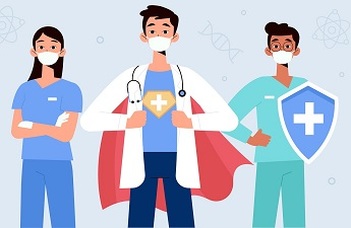Stress and Fear: Clinical Implications for Providers and Patients

The worldwide coronavirus disease 2019 (COVID-19) pandemic has presented extraordinary challenges for the underprepared health systems, these challenges have profound physical and psychological health implications not only on patients but on doctors and nurses as well. This is supported by the fact that 72 percent of those working during COVID-19 in China experienced post-traumatic stress. Acute and chronic stress can have marked effects on cognition, decision-making, memory, technical performance, and teamwork, leading to impaired judgment and an increase in medical errors.
The authors of the article, Mayo Clinic, Vanderbilt University, University Hospital of Wales, Queen's University of Canada and Katalin Varga, researcher at the Department of Affective Psychology at Eötvös Loránd University, explore the measurable physiological effects of stress and fear, which are particularly important to keep in mind during an epidemic. The authors highlight the awareness that
healthcare workers, unlike ventilators, cannot run at 100% function for prolonged periods.
The study identified strategies to optimize patient care. We have selected from these in our summary below.
Strategies for Staff:
- Take advantage of diaphragmatic breathing between patient interactions.
- Meditate to improve sleep quality.
- Practice self-care: Little steps are more important than “fixing” everything at once. Adequate sleep restores immune system function and can reduce infection risk/improve infection outcome.99 Nutrition and exercise also plays a key role in multiple immune system pathways.
- Look at green plants. It helps to restore cognitive skills, especially attention. Nature and green for most of us — especially those who are working in highly technical environment —means being away from work stress and reminds us of pleasant, relaxed times.
- Remind yourself daily that you are the one who is the best trained to deal with this situation, even if the challenge sometimes seems bigger than your coping potential.
- Schedule “worry time” — write down all the things you worry about. Then decide on when you’re going to address each of the items.
- Stay connected with your loved ones, including digital methods if necessary.
- Zentensivism — Focus on what is relevant and important.
- Remember your bandwidth — Our working memory is only able to hold in mind 7±2 pieces of information, and so much right now is preoccupied with COVID-19. Take your time with big decisions. It might take longer to think things through if you are feeling overwhelmed.
- Reflect on positive aspects of what you experienced — Actively find positive moments (teamwork, collegiality, patient not dying, supportive tweets, etc). Use positive self-suggestions such as “I am able and will manage it,” “I have strong reserves,” ”I am strong and quiet deep inside,”. Be proud of yourself. You are providing very important service for mankind.
Strategies for Mindful Patient Interactions
What can healthcare workers do to stay humane during the epidemic? How to be attentive, stay positive when interacting with patients? The following science-based strategies aim to help:
- Praise your colleagues for their assistance, use the word “thank you” and “please” as frequently as you can. Lack of appreciation exacerbates work-related stress, and feeling recognized decreases psychological strain at work. Feelings of gratitude can also decrease the levels of stress and burnout, improving a sense of well-being. Say “sorry” if you were rude or aggressive with someone (colleague, patient). Briefly, simply. This way we can prevent the accumulation of tension,
- Use “Get to Know Me” board. It is a poster that introduces information about the patient’s routine life, including hobbies, activities, accomplishments, favorite books, movies, food, and other information.
- Positive communication and awareness of language — Say “good morning,” “sleep well,” or parting with the words, “have a nice day.”
- Reassure that we are prepared to help and take care of them.
- Post printed pictures of the team caring for the patient with descriptions of who they are so patients can see faces, not just the masks, and know who their team members are.
- Hello, my name is… — Emergency physicians have recently designed a simple poster that can help connect with the patient and their family.
You can access the English publication and the full list at this link.

